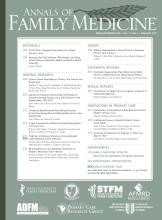Abstract
PURPOSE Despite concerted actions to streamline care transitions, the journey from hospital to home remains hazardous for patients and caregivers. Remarkably little is known about the patient and caregiver experience during care transitions, the services they need, or the outcomes they value. The aims of this study were to (1) describe patient and caregiver experiences during care transitions and (2) characterize patient and caregiver desired outcomes of care transitions and the health services associated with them.
METHODS We interviewed 138 patients and 110 family caregivers recruited from 6 health networks across the United States. We conducted 34 homogenous focus groups (103 patients, 65 caregivers) and 80 key informant interviews (35 patients, 45 caregivers). Audio recordings were transcribed and analyzed using principles of grounded theory to identify themes and the relationship between them.
RESULTS Patients and caregivers identified 3 desired outcomes of care transition services: (1) to feel cared for and cared about by medical providers, (2) to have unambiguous accountability from the health care system, and (3) to feel prepared and capable of implementing care plans. Five care transition services or provider behaviors were linked to achieving these outcomes: (1) using empathic language and gestures, (2) anticipating the patient’s needs to support self-care at home, (3) collaborative discharge planning, (4) providing actionable information, and (5) providing uninterrupted care with minimal handoffs.
CONCLUSIONS Clear accountability, care continuity, and caring attitudes across the care continuum are important outcomes for patients and caregivers. When these outcomes are achieved, care is perceived as excellent and trustworthy. Otherwise, the care transition is experienced as transactional and unsafe, and leaves patients and caregivers feeling abandoned by the health care system.
Footnotes
Conflicts of interest: S.E.M. is a non-product speaker for Merck & Co. M.V.W. has received grant and contract funding from the Patient-Centered Outcomes Research Institute, AHRQ, BlueCross BlueShield of Illinois, and has received royalty payments from Elsevier for the reference text book Comprehensive Hospital Medicine. To the best of our knowledge, no other conflicts of interest, financial or other, exist for any of the authors.
Funding support: This work was supported through a Patient-Centered Outcomes Research Institute (PCORI) award (Contract #TC-1403-14049).
Disclaimer: All statements in this report, including its findings and conclusions, are solely those of the authors and do not necessarily represent the views of the Patient-Centered Outcomes Research Institute (PCORI), its Board of Governors or Methodology Committee.
Previous presentations: Study results were presented on a webinar with America’s Essential Hospitals on February 17, 2016.
- Received for publication February 15, 2017.
- Revision received October 26, 2017.
- Accepted for publication November 18, 2017.
- © 2018 Annals of Family Medicine, Inc.







